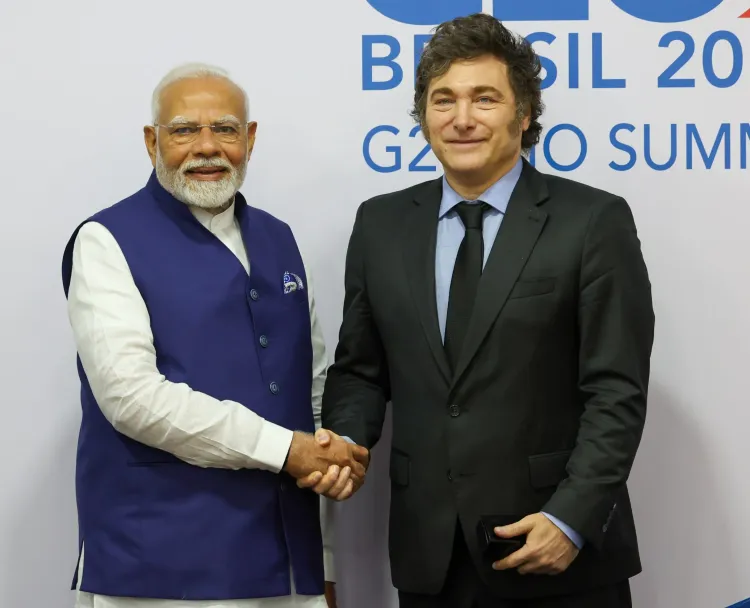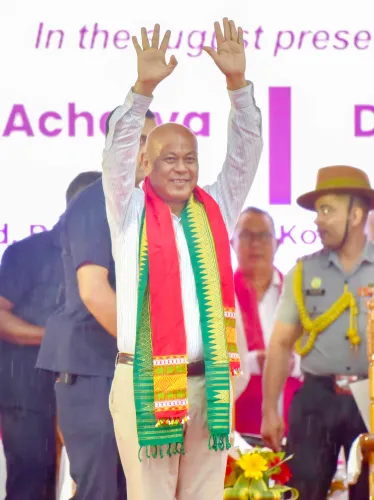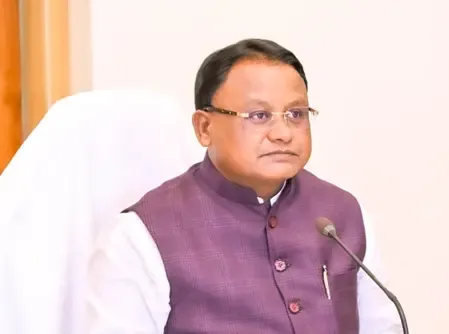What Are the Implications of PM Modi's Historic Visit to Argentina?

Synopsis
Key Takeaways
- Historic visit: PM Modi's first bilateral trip to Argentina in 57 years.
- Economic cooperation: Focus on trade, defense, and mineral resources.
- Strategic partnership: Strengthening ties since 2019.
- Critical minerals: Lithium and other resources crucial for India's green energy transition.
- Growing trade: Bilateral trade surpassed USD 6.4 billion in 2022.
New Delhi, June 30 (NationPress) Prime Minister Narendra Modi is set to embark on a pivotal journey to Argentina this week, coinciding with the nation’s significant economic reforms, reminiscent of India's past changes, as stated by the Ministry of External Affairs (MEA) on Monday.
PM Modi will be in Argentina for an official visit from July 4-5, following an invitation from President Javier Milei.
This visit marks the third stop on his five-nation tour, which includes Ghana and Trinidad and Tobago starting July 2, before heading to Brazil (July 5-8) and Namibia (July 9).
While PM Modi previously attended a G20 meeting in Argentina in 2018, this trip will be the first bilateral visit by an Indian Prime Minister in 57 years, making it a historic occasion.
The Prime Minister's itinerary includes paying homage at the statue of General Jose de San Martín, a beloved freedom fighter and national figure in Argentina. Following this, he will receive a ceremonial welcome and engage in delegation-level discussions, culminating in a luncheon hosted by President Milei.
Since 2019, Argentina has been a strategic partner for India, and both nations celebrated 75 years of diplomatic relations last year.
The MEA indicated that discussions will focus on economic and trade matters to further solidify bilateral ties.
“India's progress in defence manufacturing, the space sector, and innovative fields such as information technology and DPI can provide valuable insights. We can also share our knowledge in Telemedicine and digital healthcare solutions to enhance medical service access and improve healthcare delivery,” stated MEA Secretary (East) P. Kumaran during a media briefing prior to the PM's visit.
Both leaders are expected to review ongoing collaborations and explore avenues to elevate India-Argentina partnerships in vital sectors including defence, agriculture, mining, oil and gas, renewable energy, trade and investment, and people-to-people relations.
India and Argentina have made significant strides in bilateral cooperation within the mineral resources domain, especially concerning lithium — a crucial component for India's transition to green energy. An MOU on mineral resources cooperation was signed in August 2022, with the inaugural meeting of the Joint Working Group taking place in January 2025.
“Argentina boasts the second-largest shale gas reserves and the fourth-largest shale oil reserves globally, alongside considerable conventional oil and gas deposits, positioning it as a potential energy ally for India. The nation's abundant reserves of critical minerals, such as lithium and copper, align with India's rising demand for secure and sustainable supplies for clean energy and industrial development. India's public sector entity, KABIL, has secured several concessions in Argentina since 2024, and further discussions on this topic are anticipated,” Kumaran added.
Notably, bilateral trade between India and Argentina surged more than twofold from 2019 to 2022, reaching USD 6.4 billion in 2022. In 2021 and 2022, India emerged as Argentina's fourth-largest trading partner. Argentina is also a key supplier of edible oils — specifically soybean and sunflower — to India. By 2024, total annual bilateral trade between the two countries increased by 33% to USD 5.23 billion, establishing India as Argentina's fifth-largest trading partner and export destination.









